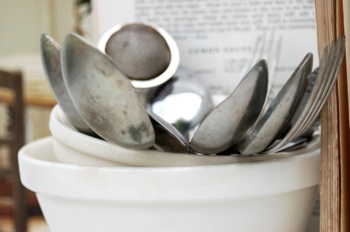
Nobody trusts a skinny chef! How often have you heard that phrase? I think a chef started that so they would have an excuse for being round and jolly.
The dangerous reality of being an overweight chef is that the physical stress of carrying around extra weight, combined with the already rigorous hard work, wear and tear on your body is the perfect recipe for serious physical ailments that can hinder a successful career.
A chef hitting their mid-to-late 40’s and carrying around 50 extra pounds often faces a variety of seriously debilitating health problems. I have witnessed so many of my colleagues dealing with health crises that have compromised them in the kitchen. They have faced hip replacements at 45, a double knee replacement at 48, high blood pressure at 44, diabetes at 50 and even a heart attack at 42.
What people often forget is that kitchen work is very physical labor, with lots of repetitive motions and almost continual stress during service. After a typical high-stressed, physically demanding 15 hour day in the kitchen, even a fit and trim chef has throbbing dogs, an aching back or serious shoulder pain — imagine carrying excess weight equal to a bag of flour (or two) on top of that?
I worked side by side with my husband Joe in 7 different professional kitchens over the past 34 years. When it was time for the family meal before service, he would sit and eat a full meal, honestly believing in his head that he hadn’t eaten all day. He clearly didn’t remember all the tastings, tidbits and scraps he nibbled on during his daily tasks of the kitchen.
What made Joe fat over the years, was his unconscious eating, better know as PICKING. He was so oblivious to shoving things in his mouth, I would tell him when I saw him doing it, reminding him what he ate through out the day — a hand full of breakfast home fries, trimmings from a sliced cured brisket, a cleaned lobster claw, a cup of gumbo, a couple of strips of fresh cooked bacon — just to name a few typical culprits that tantalize and tempt while you work.
Joe’s constant excuse was "my metabolism", he would tell me that I ate as much as him and didn’t gain weight. Well that was true at meal time, because I didn’t pick at all during the day, unless I was just starving, I would eat a piece of cheese, carrot or celery stick, slice of turkey or chicken to hold me until I could stop to eat. I didn’t mechanically consume my daily allowance of calories roaming around the kitchen doing my production.
So what’s the secret to changing this kitchen behavior? There is no secret, there is just self control, commitment and process. Joe realized that his relationship with and love for food was ruining his career, his confidence, his appearance and his level of energy. He took a good long look at his daily routine and put some guidelines in place to follow:
1. Keep tasting spoons handy. Do not put anything in your mouth with out using a tasting spoon. We are chefs, we have to taste a variety of items during the course of our day, But I said a taste, not a cup, not a handful, not portion.
2. Don’t taste everything. If you are cleaning lobster for a salad, peeling shrimp for cocktail, plating French fries, carving a cooked prime rib, braising short ribs, slicing cold cuts or cured meats, do you really need to taste those items?
3. Keep track of what you are eating. Write down everything you are consuming during the day.
4. Keep hydrated. Drink at least 4-5, 16oz bottles of water daily.
5. Stop to eat a healthy snack. Have better choice alternative foods available if you get hungry: bananas, grapefruits, grapes.
6. Eat a healthy family meal. Make good wholesome family meals for you and your staff. Sit and eat with them, it’s a great team building tool as well as providing the proper fuel you need to complete your job efficiently.
7. Eat before service, not after service. Chefs typically eat late night meals, then go home and relax, maybe have a glass of wine or beer not burning the calories of the last meal of the day.
8. Get enough exercise. The most important thing, which most chefs think isn’t necessary, Exercise…. Why? We run around the kitchen all day, lifting, walking, pushing, bending and often taking multiple levels of stairs. This is very true, but a trainer will tell you that your body adjust to these daily activities craving additional activities for maximum health benefits. A power walk before work, stretching in the morning before you begin you day, a work out in the middle of your day or after work. Your physical wellness in this profession is a crucial part to the longevity of your career.